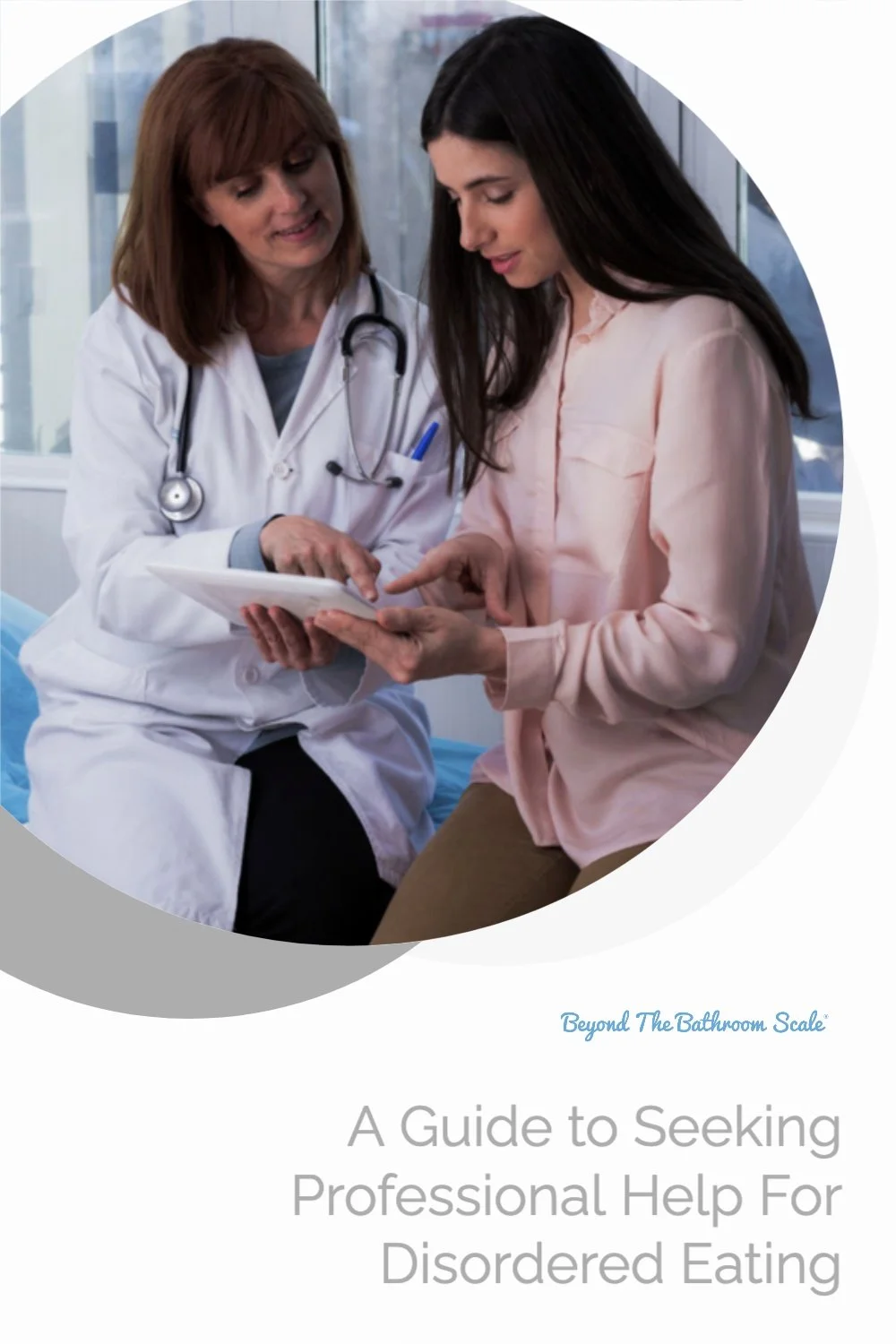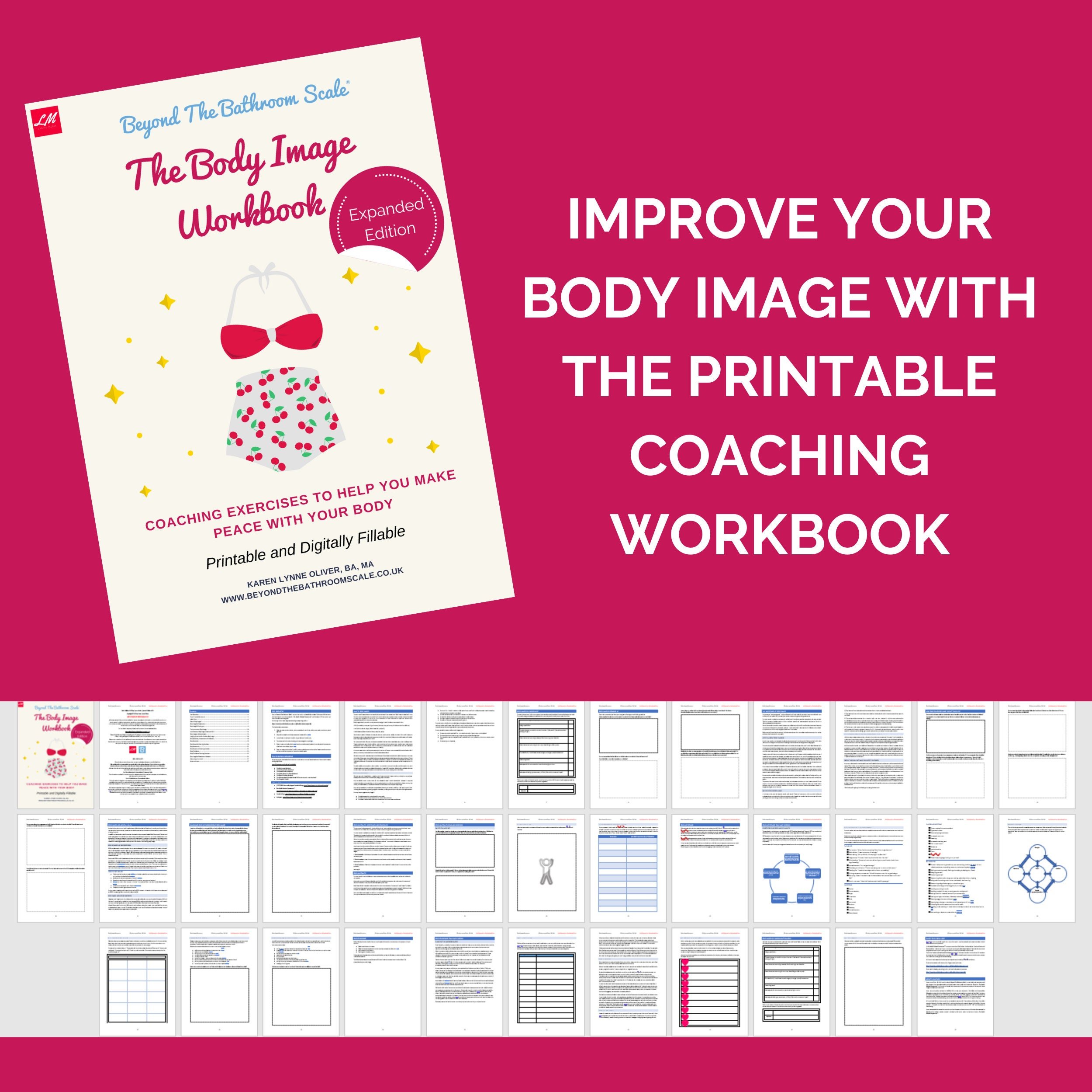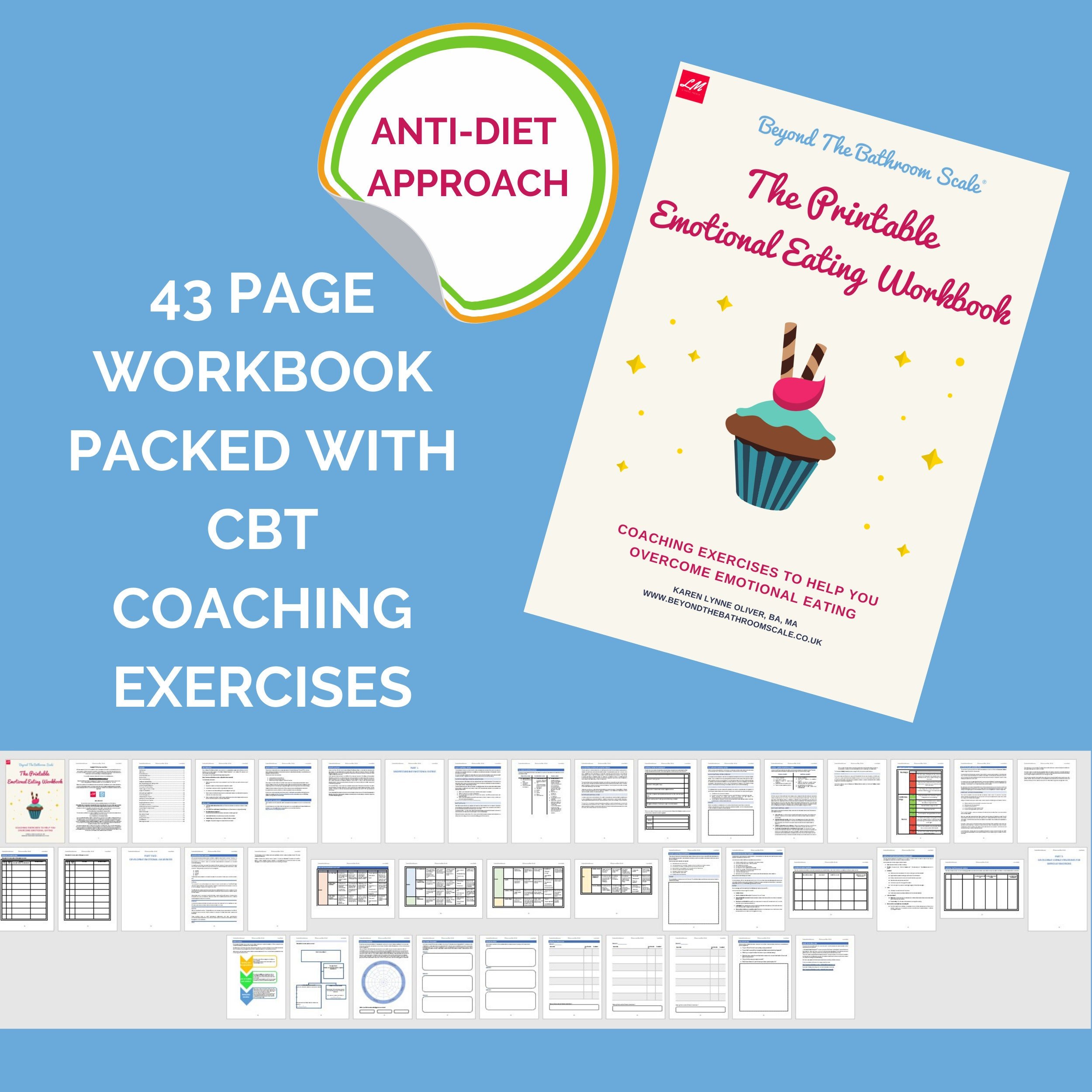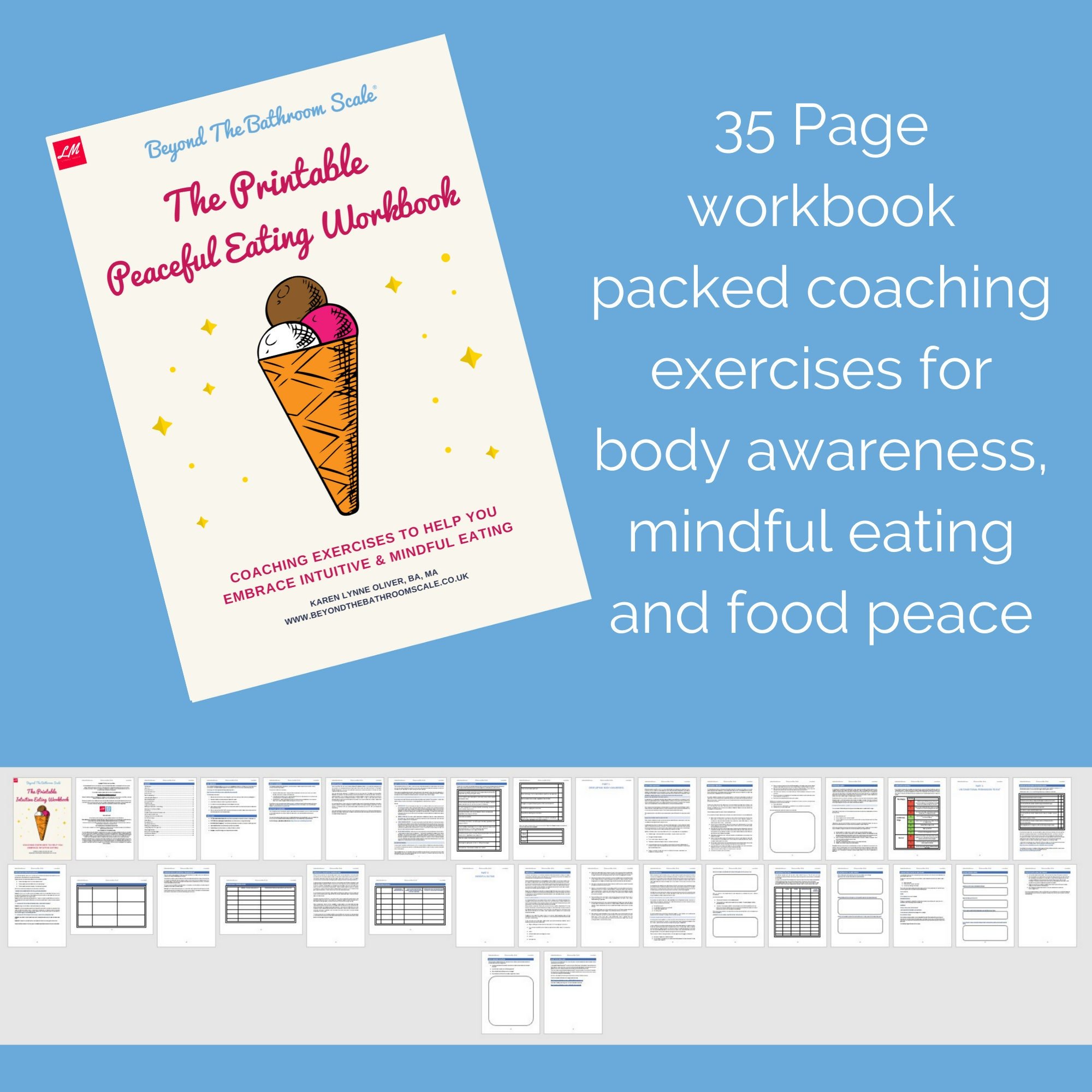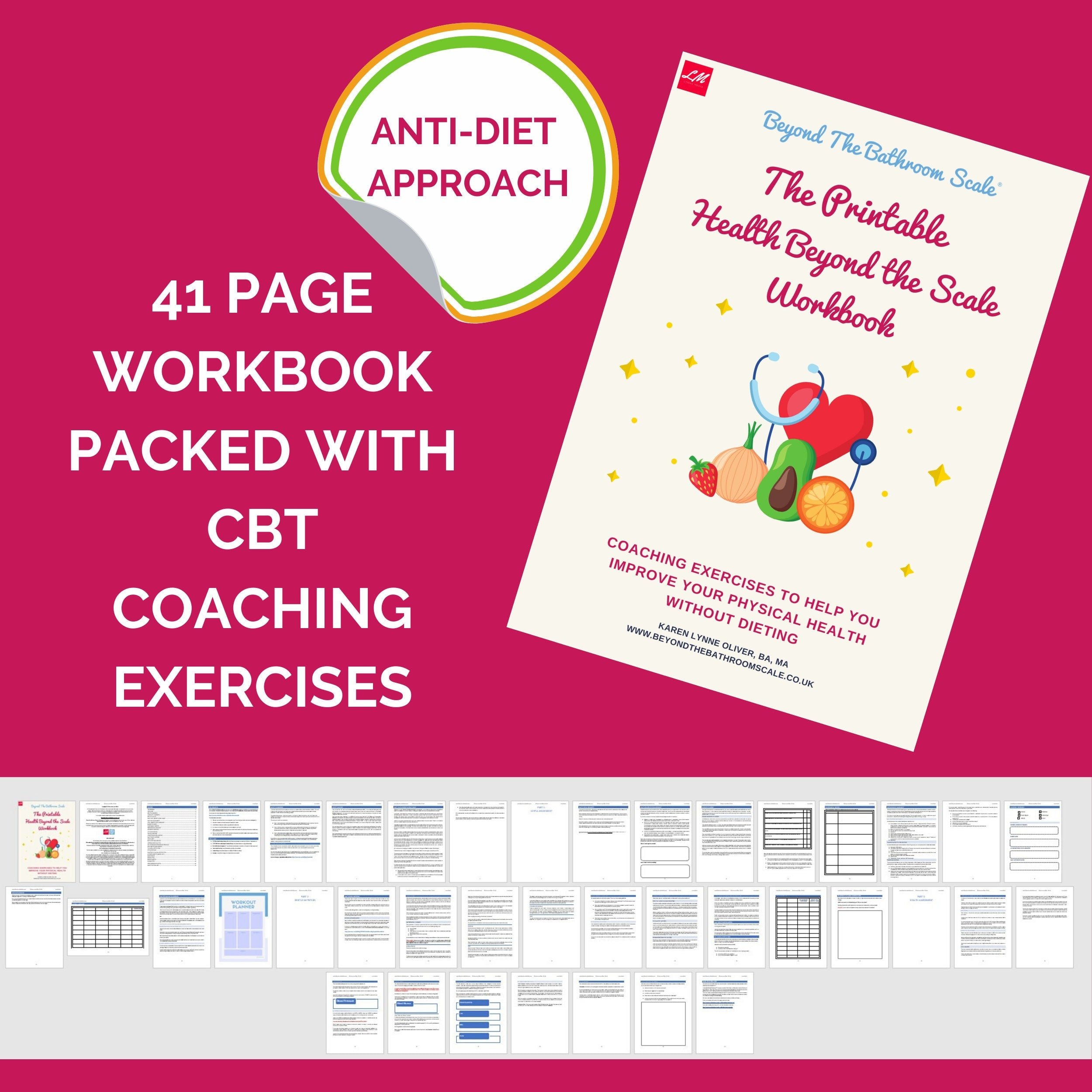A Guide to Seeking Professional Help For Disordered Eating
In this article, I expand on a Facebook Live I did in my community group on seeking professional help with disordered eating (i.e. emotional eating, binge eating, yo-yo dieting, Orthorexia and more). I discuss the most common reasons people avoid seeking professional help, why the right kind of professional help is essential for recovery, who to reach out to first and how to select the right professionals to work with.
At the end of the article, I also include a crash course guide to ‘who is who’ in the health professions, so if you’ve ever wondered about the difference between a dietitian and a nutritionist, or a counsellor and a psychologist, or what the heck a health coach is, you’ll find your answer here!
The Barriers to Seeking Help
Eating Disorders and Disordered Eating affects many people of any social demographic and of any weight and BMI. That last part often surprises people; there’s a common misconception that eating disorders are only present in underweight individuals, which isn’t the case and is reflected in the DSM-5 (Diagnostic Statistical Manual of Mental Disorders, a diagnostic tool used by health professionals).
This dangerous misconception about eating disorders and weight still persists in society (and, unfortunately, in medical professionals who lack recent training). It’s the most common reason my clients give me for not seeking help for their binge eating sooner.
“I’m overweight; how can I have an eating disorder?”
Next up are the other common misconceptions about specific eating disorders, such as Binge Eating Disorder:
“It’s not as serious as other eating disorders, like Bulimia or Anorexia”
“People will say I just lack control or willpower around food”
“My doctor told me to lose weight, exercise and track my food”
“I feel like I’m too old to have an eating disorder”
Sadly, I hear these all the time from coaching clients, and I tell them the same thing:
All eating disorders need to be taken seriously by medical professionals.
All eating disorders are damaging to our health, physically and mentally. They all cause pain and suffering.
No one should have to struggle alone or be denied access to the right type of support.
Eating disorders have nothing to do with personal responsibility - they’re not about choice, willpower, self-control, motivation or laziness. They’re much more complex and they don’t actually have much at all to do with food when you dig really deep into them.
Why Seek Professional Help for Disordered Eating?
We’re currently living in the Self-Help Age; how many times have you Googled your problems before going to an expert?
I know I do it!
Whether I have a problem with my laptop, an odd knocking sound in my car, the first symptoms of illness, or a DIY question. We will take literally any problem to Google and search for quick help and advice.
Even offline newsstands and bookshelves are jammed full of self-help books and guides.
There are a lot of great self-help resources out there (side note: I offer an app-based self-help programme for disordered eating & negative body image), and it’s fantastic that thanks to the internet, we’re able to access resources at any time for very little cost. It can be empowering to take control of your recovery, and often, self-help is the stepping stone you need to take your problems seriously and reach out for further support.
That said, taking the self-help approach to eating disorders, health, fitness, and nutrition can be problematic and very dangerous for a number of reasons.
Firstly we need to make sure that the advice is coming from a credible source who has had relevant training and registered with an independent body where appropriate.
You wouldn’t ask the receptionist at the doctor’s surgery to perform surgery on your leg, but yet many people fall into the trap of accepting health advice from a slimming group consultant who has absolutely no medical training in eating disorders, nutrition or health. Group consultants are purely trained in dishing out the diet plan and are little more than salespeople for the company.
Secondly, Self-Help is not tailored to our specific needs, health issues, histories and circumstances. When we’re reading self-help books, we are reading them from our own perspective of our disordered eating, which may be entirely different from an outsider’s perspective of our disordered eating. It’s important to be aware that our own perspective may be skewed by misconceptions like the common beliefs I’ve listed above.
An example of this is that many of my clients come to me thinking they have a problem with binge eating or compulsive overeating, when actually, from my outsider (and weight-neutral perspective), I can see that they have a problem with chronic restriction and under eating which then leads to episodes of rapid overeating (not necessarily classified objectively as a binge, we may call them ‘subjective binges’). Therefore, when seeking help, we also need to be open to the possibility of being diagnosed with something entirely different to what we’ve previously been Googling, something a self-help book or article cannot do effectively because of our internal bias and misconceptions.
Who To Contact First For Professional Help With Disordered Eating
Your first point of contact should ideally be your general practitioner (GP). I say this for a couple of reasons.
Firstly, your GP can also diagnose and rule out any related health conditions with a few simple tests. This can include blood work to check for health issues such as thyroid, nutritional deficiencies, diabetes, high cholesterol and more. This is an essential step as these conditions require care management under the supervision of a health professional.
Secondly, your GP can make appropriate referrals (or point you in the direction of how to self-refer in your local area) for help from a registered dietitian, nutritionist, therapist or counsellor. In a moment, I’ll come back to what you should look for in a health professional and who to have as part of your care team.
Unfortunately, doctors only receive a few days of training in eating disorders as part of their medical training, and many of them still view eating disorders through a ‘weight bias lens’, i.e. they focus on weight management primarily and risk missing the signs of eating disorders because they get hung up on a patient’s BMI.
Some of my clients have reported that they felt they weren’t taken seriously by their GP and, worse, have been recommended diet plans for weight management instead of referrals for psychological intervention. It’s important that you go into your appointment with an idea of what sort of help you would benefit from an advocate for yourself (to help with this, I’ll be writing a separate post on how to tackle weight bias from your health care professional in the near future). You may find taking printed information from an eating disorder charity website like Beat helpful too.
What to Look For in a Healthcare Professional
When you’re considering working with a professional, you'll need to consider the following:
Qualifications
Accreditation/registration – representing a commitment to certain standards of care and ongoing training.
Area of expertise
Experience
Type of help they offer
Access (where will appointments take place; how much do they charge (if not an NHS referral); how often will you meet with them; what days and times)
Will they take your eating disorder seriously, regardless of your weight. We call this working from a ‘weight neutral perspective’ or the ‘Health At Every Size paradigm’. If a professional would recommend a relatively similar course of action for two individuals of similar health and circumstances, with the only difference being their BMIs, then they are likely to be working from this perspective.
Putting Together Your Recovery Team
In an ideal world, anyone struggling with disordered eating would have access to an understanding GP, a mental health professional such as a therapist and where there is a need to manage health conditions alongside an eating disorder, a dietetic professional such as a dietitian.
So, which professionals can help you, and what can they help you with? It can be confusing to know who to reach out to when there are so many professional titles and varying qualifications, so below, I’ve included a guide to who’s who.
Dietitian
These are your go-to professionals for specific and tailored nutritional advice to manage a dietary need, such as an allergy, intolerance or other diet-related condition, such as IBD or diabetes.
Dietitians are legally permitted to dispense or supply prescription-only medication, such as insulin. They can also manage dosages of nutritional supplements.
Currently, they are the only professionals in the field of nutrition who are ‘statutorily regulated’.
‘Dietitian’ is a legally protected title and can only be used by those who are registered with the Health and Care Professionals Council (HCPC).
Individuals must have a minimum of a BSc Hons in Dietetics or a BSc Hons in biological science of relevance, along with a postgraduate diploma or degree.
They study physiology, anatomy, biochemistry, microbiology, and many other areas of science.
Nutritionist
Nutritionists are qualified to provide general information and education about food and healthy eating. They are not trained to give specific information about therapeutic diets.
The title ‘nutritionist’ is not protected by law in the UK, you are advised to check they have adequate training.
Those who are registered with the UK Voluntary Register of Nutritionists (UKVRN - regulated by the Association for Nutrition) can refer to themselves as a ‘Registered Nutritionist’, or as a ‘Registered Public Health Nutritionist’.
To qualify for registration with the UKVRN, nutritionists can either study on a course that has been accredited or must provide evidence of strong knowledge in the field.
Registers such as UKVRN, check qualifications, insurance and experience and often implement their own Code of Ethics and Complaints Procedure so that potential clients can feel assured of their practitioner’s professionalism.
Nutritional Therapist
A nutritional therapist looks at what improvements or changes an individual can make to their diet to improve their overall health and well-being.
Nutritional therapy is recognised as complementary medicine, appropriate for both those with chronic conditions and those looking to prevent future illness.
The title is not currently regulated by law within the UK.
The Complementary and Natural Healthcare Council (CNHC) is one of several industry professional bodies to have established a register that professionals can voluntarily opt to join.
Under the Accredited Voluntary Register (AVR scheme (set up by the Department of Health), independent registers, like the CNHC, can apply to be assessed by the Professional Standards Authority (PSA) - the standard setting body for health and social care voluntary registers. Upon meeting their criteria, a voluntary register will then become accredited by the AVR.
Nutritional Therapists who register with the CNHC may refer to themselves as 'CNHC Registered Nutritional Therapists'.
To be eligible for registration, a nutritional therapist must have undertaken training that meets the minimum national standards of practice - as set by the Nutritional Therapy National Occupational Standards and the Nutritional Therapy Core Curriculum.
Personal Trainer
Personal Trainers specialise in physical exercise and fitness. They can advise on suitable workout plans, adaptations and correct form.
Some PTs will discuss nutrition with their clients and encourage them to eat healthily to support training needs. They and can provide generalised information about healthy foods and share meal prep tips and recipes, but they cannot ‘prescribe’ a specific diet or supplement (this is the remit of other professionals, such as a dietitian).
Individuals who undertake an accredited personal training course (from a provider such as the YMCA or The Training Room) can register with the Government-backed Register of Exercise Professionals' (or REPs) provides a framework that recognises the qualifications and expertise of professionals in the fitness industry.
This includes group exercise instructors, Yoga teachers and personal trainers who are trained to Level 3 as well as Level 2 Exercise to Music trained instructors (often the foundational qualification of a Zumba instructor) and Aqua instructors.
For specialised Personal training, such as antenatal or injury rehabilitation, PTs are trained to Level 4.
Health & Wellness Coach
Coaching is a great complementary tool to have alongside professional care. Many health and wellness coaches focus on habits, mindset and body confidence. This is often the missing piece of the puzzle for many people when looking to turn their lifestyles around.
A good health coach will ask you about the other professionals involved n your care and their plans of action. They will ideally be looking to complement the work of other professionals rather than provide an alternative. They should encourage you to follow the care plans outlined by other professionals and can be a good source of accountability in your recovery journey.
Coaches should not advise on a course of action but instead, use psychology-based exercises to help you come up with your own solutions. They may do this by drawing on cognitive behavioural therapy exercises and Motivational Interviewing (these are the tools I use in my own coaching practice).
Some things to keep in mind when looking to work with a health coach:
Health & Wellness coaches are generally not qualified to advise on the science of nutrition or physical fitness.
‘Health coach’ is not a legally protected title and as it stands there is no recognised register or regulatory body in the UK.
There is no formal minimum standards of practice or core training curriculum for health coaches to adhere to.
Many health coaches will have undertaken a coaching course to be considered ‘certified’, but this is not to be confused with an ‘accredited’ qualification (i.e. the qualification has not been regulated by a government-backed organisation like REPs, CNHC, or UKVRN).
It might be the case that a health coach is a professional from another discipline and brings their expertise from that discipline into their practice. To use myself as an example, I qualified as a Social Worker with a focus on mental health and therefore use the skills I developed in my Social Work training in my coaching practice.
Counsellor / Psychotherapist (therapist)
The aim of both psychotherapists and counsellors is to create an environment in which you feel safe discussing your feelings.
Counselling can take place on an individual basis, in groups, or in families and couples. Counselling sessions can take place face-to-face, via Skype, by email or over the phone. Counsellors encourage you to find your own solutions, rather than telling you what to do.
The term ‘counsellor’ or ‘psychotherapist’ is not legally protected title in the UK.
You are advised to check a counsellor/therapist’s qualifications and experience.
Counsellors and therapists are trained in psychotherapy, usually to degree or post graduate level.
Some therapists take on additional training to specialise issues, such as eating disorders, low self-esteem, trauma, phobias, abuse, anxiety and depression, family issues, marriage, addictions.
Psychologist
Psychologists are often either entirely research-focused or 'applied' (meaning they treat clients).
Counselling psychologists tend to deal with the same types of issues as counsellors. These include bereavement, trauma and relationship issues. They also take on more serious, long-term issues such as domestic violence and sexual abuse.
Many psychologists choose to specialise in a particular type of assessment or therapy (for example CBT or neuropsychology).
To have the title ‘psychologist’, the individual needs to have a degree in psychology.
A counselling psychologist will need to have a doctorate in counselling psychology, as well as a general degree in psychology.
There are many titles within the psychology industry that are restricted by law in the UK. These include: clinical psychologist, counselling psychologist, educational psychologist, forensic psychologist, health psychologist, occupational psychologist, practitioner psychologist, registered psychologist, sport and exercise psychologist.
This means that anyone with these titles must be listed with the Health and Care Professions Council (HCPC) by law. ( )
Being listed with the HCPC ensures that they have had the relevant training and adhere to a strict code of conduct.
Psychiatrist
A psychiatrist is someone who has had medical training and has decided to specialise in psychiatry. The term psychiatry refers to the study of mental disorders. This includes their diagnosis, management and prevention. Psychiatrists often work on a broad range of cases alongside an area of expertise and research.
As psychiatrists have medical training, they can do things other mental health professionals can't. For example, a psychiatrist can carry out medical tests (i.e. blood tests and CAT scans). They can also prescribe medication should it be required.
For an individual to call themselves a ‘psychiatrist’, they must train for five years as a doctor. A further two years of 'foundation' jobs is needed before specialising in psychiatry. To become a fully trained psychiatrist it typically takes another four years of dedicated study. There is also an option to specialise further still.
You can check the details of a psychiatrist, including their area of speciality, by looking on the medical register, a directory of all practising doctors in the UK.
If they have the letters MRCPsych (Member of the Royal College of Psychiatrists) or FRCPsych (Fellow of the Royal College of Psychiatrists) after their name, they're a current member of the Royal College of Psychiatrists (RCPsych).
I hope this guide has cleared up any misconceptions you may have about seeking professional help for disordered eating and that you feel better prepared to advocate for your care needs and seek out a professional who takes your disordered eating seriously and from a weight-neutral perspective.
If you have any questions or anything you would like to add, drop them into the comments below, or join our private community group on Facebook: Beyond The Bathroom Scale.

